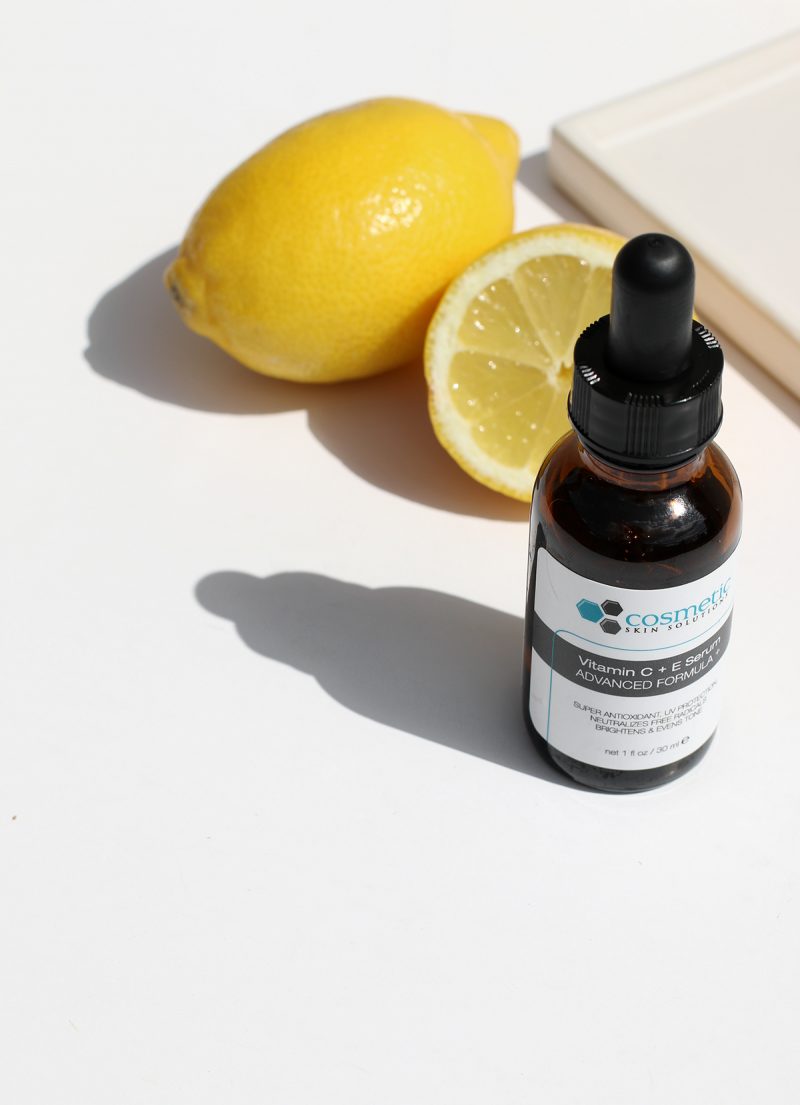 This post idea started with a serum.
This post idea started with a serum.
A vitamin C serum to be more precise.
We’ve already covered that it’s one of the most important skincare essentials, a key anti-aging ingredient, a staple of a good beauty routine. So, I set out to research the best available vitamin C serum out there.
Related: A guide to vitamins in skin care
One item kept popping up as a highly recommended, holy-grail product: SkinCeuticals C E Ferulic, a very potent, 15% vitamin C serum, strengthened by the two best friends of vitamin C, vitamin E and ferulic acid. People raved about its results.
The tiny problem with it?
It costs $166.
And while I’m usually not opposed to spending money on quality products, almost $170 for a serum that may or may not be that good seemed a little too much, even for me.
I wondered whether there was an alternative. Something that’s equally as good, for maybe a third or at worst case, half of the price.
Finding the dupe
I didn’t actively look for a dupe for this particular serum, but the term kept popping up. The perfect alternative according to the experts seemed to be this product: Cosmetic Skin Solutions Vitamin C+ E serum.
The price?
$40.
That already sounded much better, so the next logical step was a look at the ingredient lists.
The ingredient list of the SkinCeuticals serum:
Aqua/Water/Eau, Ethoxydiglycol, Ascorbic Acid, Glycerin, Propylene Glycol, Laureth-23, Phenoxyethanol, Tocopherol, Triethanolamine, Ferulic Acid, Panthenol, Sodium Hyaluronate
And Cosmetic Skin Solutions one:
Water/Aqua/Eau, L-Ascorbic Acid (15%), Propylene Glycol, Ethoxydiglycol, Butylene Glycol, Laureth-23, Zinc Sulfate, Glycerol, Alpha Tocopherol (1%), Triethanolamine, Ferulic Acid (.5%), Phenoxyethanol, D-Panthenol, Hyaluronic Acid
As you see, the ingredient list is almost identical, and the % of the 3 active ingredients is the same. So what may cause the price difference?
I don’t want to go too deep into the specifics, mainly because I don’t plan to write 3,000 words on a single serum. The gist is that it’s not only the ingredient list that decides whether a vitamin C serum will work or not – the pH is absolutely crucial as well. And this is where SkinCeuticals holds the edge over all other serums. L-ascorbic acid is notoriously unstable and works best with a pH of or below 3.5. And SkinCeuticals happens to hold a patent on all l-ascorbic acid serums with 5% to 20% L-ascorbic acid, 0.5% to 5.0% ferulic acid, and 0.5% to 2.0% vitamin E with a pH range of 2.0-3.5 (theirs is around 2.5-3).
So, the dupe must have a totally different pH level, right? Well, surprisingly, some measured it around 3, others even lower.
So, how exactly can the Cosmetic Skin Solutions get away with this if SkinCeuticals have a patent? Does CSS break the law? Did they find a loophole? Or are there no connections between the two products, they are just both good serums?
To be honest, I don’t know. I tried to find the answer, but the internet refused to give it to me. That also kind of reinforces my eternal problem of how difficult it is for customers to see through the beauty marketing and get accurate information on the science and the products themselves.
I’ll be honest, I didn’t know about this whole patent thing before I bought the Cosmetic Skin Solutions serum. I’m still undecided about whether it’s on firm legal and ethical territory, but it also got me thinking about the whole beauty dupe industry.
Is buying dupes smart or unethical? Are we smart customers who find cheaper, but just as good alternatives? Or is there something shady going on?
Let’s try to assess it from both points of view.
A case against beauty dupes
Most of us would agree that we shouldn’t buy illegal things. I also happen to be in the camp that would never, ever buy fake designer items or knockoffs. It’s tacky, but also deeply unethical. I feel the same way about big brands stealing smaller, independent designers’ work as well. It’s a no-go.
But the more I think about it, the grayer this whole area seems – both from a legal and ethical point of view. Let’s take fashion. The designers decide next seasons’ main trends, colors, form, and patterns. The cycle usually goes from the runways to the designer shops and then down to the fast fashion stores and mass consumption (remember Miranda Priestly’s speech on the blue sweater in The Devil Wears Prada?)
Sure, there’s a difference between being a counterfeit (something that not only rips of the design but the brand logo and other characteristics as well in order to trick consumers) and being a dupe or knockoff (something that was heavily influenced by the original but does not violate the patent or copyright).
The first is of course illegal. The second is not, though one can make a case for it not being totally ethical. It’s also interesting how the terms signify a difference. Counterfeit or knockoffs are bad. Dupes on the other hand? Smart and savvy.
Where do we draw the line? Yes, designer stuff is often unfairly overpriced, so we are happy when we find something similar for much cheaper. But is that ethical? Someone came up with that design, it was the result of creativity, imagination, expert craftsmanship and superior skills. How much are those things worth?
And what about that beautiful new Chanel eyeshadow palette with the elaborate color and pattern that suddenly appears at drugstore brands? The eerily similar packaging? The formula that at first glance promises the same results as the pricier counterparts?
When it comes to beauty dupes, the counterarguments hold that these brands capitalize on other brands’ intellectual property, research, craftsmanship, and creativity. And there’s a case for that. Why else would someone imitate a packaging, formula, or color other than to trick consumers into thinking they will get the same thing just for a fraction of the price?
Sometimes they do get it, sometimes they don’t. Let’s not forget that good formulations require tons of research (at least in theory). That could mean that there is a reason that a bigger company has pricier products – maybe they did put in the research money and actually found the best formulations (which are more than a simple ingredient list, so more difficult to emulate). In that case, the price may be warranted and you’ll probably not get the same thing for much cheaper.
If you’re interested in the issue, here are two excellent articles on the ethical and legal aspects of this dupe culture:
Dupe Cosmetics Prove Big Business, But Not Without Legal Complications
Op-Ed | Are Beauty ‘Dupes’ Legal?
A case for beauty dupes
Supporters of beauty dupes rightly say that a lot of skincare and makeup products are ridiculously overpriced and thus incredibly elitist. I totally agree that caring for our skin or using makeup should not be the exclusive privilege of the wealthy.
And some products and brands just really take it too far. I have serious doubts that a $200 moisturizer is really worth that much money. Sometimes I feel we are being taken advantage of, companies are capitalizing on our self-douts or confidence issues just to get more money out of us (For more, please read this post).
When it comes to the formulations, often the simplest things work. Take anti-aging for example – I can count on my 1 hand the ingredients that are actually proven to work, so it’s totally understandable that companies use the same things over and over again – redressing it with fancy fantasy names from time to time.
We also know that sometimes they use similar formulas but at different price points. When Estée Lauder owns both La Mer and Clinique or L’oréal owns Lancôme, Kiehl’s and Garnier, is it really realistic to think that they do not share research results and only the pricier products work? Probably not.
Sometimes being a dupe in itself is just a marketing trick. Missha’s Time Revolution Essense ($50) is often regarded as a dupe for the cult SK-II Essence ($170). But other than both being essences and using fermentation technique, the two do not share the same ingredient list.
So, if the ingredient list is right, there’s no blatant copying, and the price really is that much better, we can probably make a case for dupes. Especially if they are just marketing terms meant to catch your attention but otherwise offer good quality.
Are there any conclusions at all?
So this should be the part where I disclose the truth about beauty dupes and take a firm side – either for or against dupes.
The thing is, I can’t.
If there’s one thing I’m sure about is that we need better regulations. I shouldn’t be researching US patent applications to find out whether I’m supporting something illegal or unethical. Authorities should do a better job at communications and transparency regarding patents, trademarks, and what constitutes illegal activity. And they should be stricter when it comes to enforcing those regulations.
I’ll try to do my research as best as I can. I’ll probably refrain from buying and thus supporting brands that spend more effort on producing something that rides the coattails of other brands and products than using their own skills and creativity to make something original.
I will continue to go deep into ingredients and be committed to finding out whether I’m a victim of beauty marketing. The relationship between ingredients and price should be a good indicator. I hate brands ripping off customers and selling them subpar products under the disguise of luxury brand promises just as much as I hate companies stealing others’ ideas. Being informed as much as we can might help us decide whether a product is really worth its price or we are being tricked.
By the way, that Cosmetic Skin Solutions serum is pretty amazing, so if anyone has any info regarding that patent issue and can decide whether they are inside or outside that ethical line, let me know. I’d love to rebuy it.
What do you think of beauty dupes? Where should we draw the line?

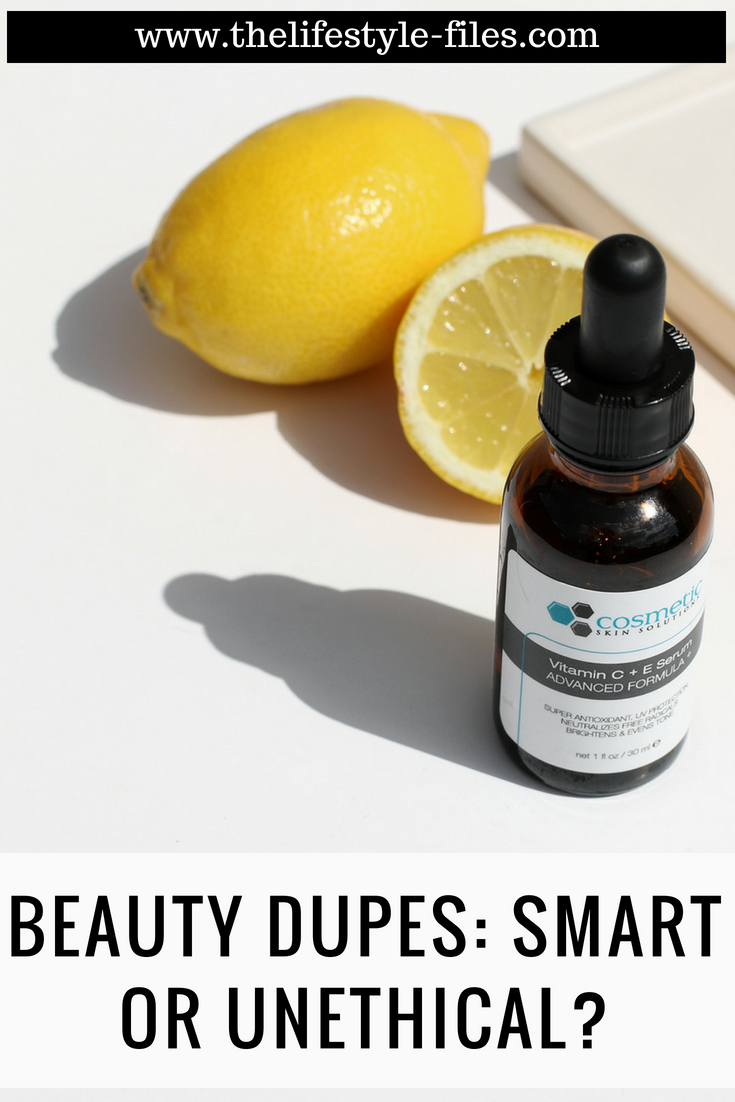
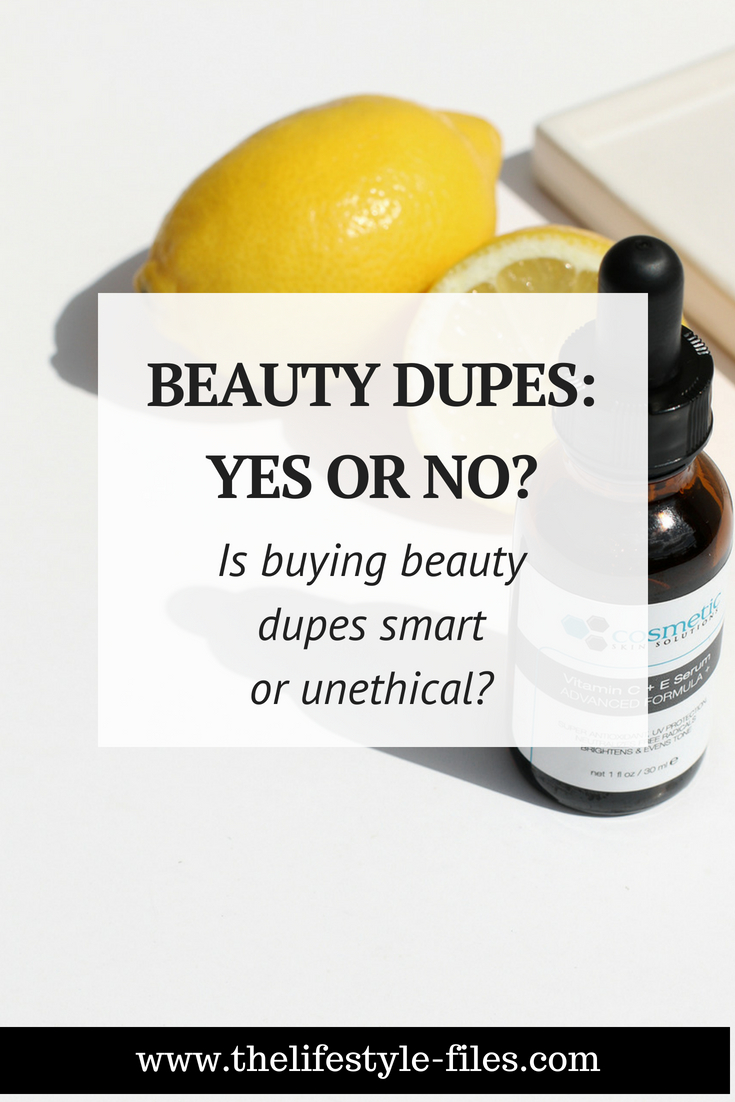
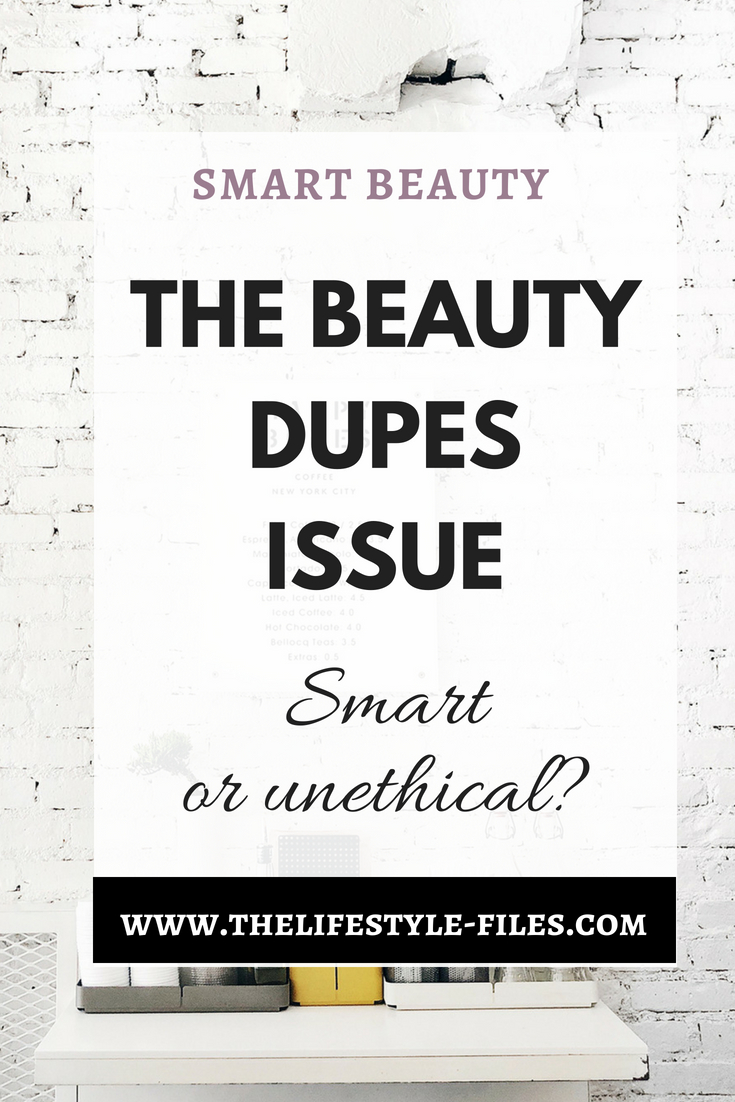
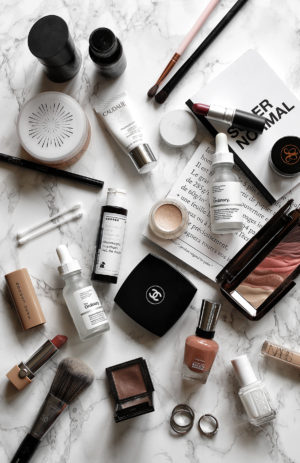
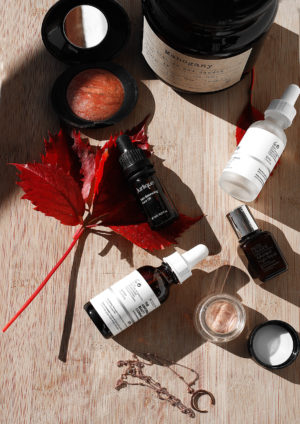
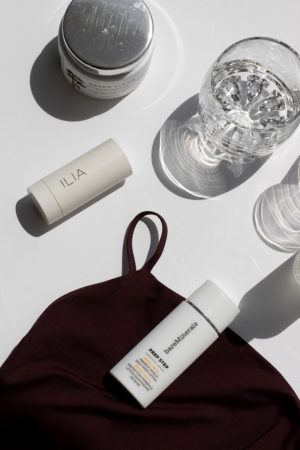
[…] • What are your thoughts on beauty dupes? […]